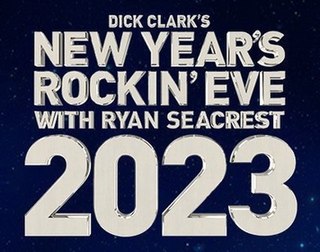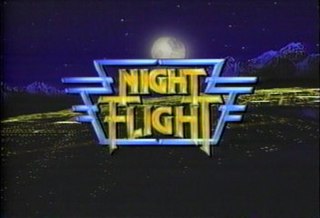
Late Night with David Letterman is an American late-night talk show hosted by David Letterman on NBC, the first iteration of the Late Night franchise. It premiered on February 1, 1982, and was produced by Letterman's production company, Space Age Meats, and Carson Productions. Letterman had previously hosted his own morning talk show on NBC from June to October 1980. The show's house band, The World's Most Dangerous Band, was led by music director Paul Shaffer. In 1993, Letterman announced that he would leave NBC to host the Late Show with David Letterman on CBS. The final episode of Late Night was broadcast on June 25, 1993. The series has continued as Late Night with Conan O'Brien, Late Night with Jimmy Fallon and Late Night with Seth Meyers.
Fridays was a late-night live comedy show that aired on ABC on Friday nights from April 11, 1980, to April 23, 1982.

Michael Anthony Richards is an American actor and former stand-up comedian. He achieved global recognition for starring as Cosmo Kramer on the NBC television sitcom Seinfeld from 1989 to 1998. He began his career as a stand-up comedian, first entering the national spotlight when he was featured on Billy Crystal's first cable TV special, and went on to become a series regular on ABC's Fridays.
Rhonda Honey Shear is an American television personality, comedian, actress, and entrepreneur. She is known for her role as a host in the 1990s USA Network's weekend B movie show, USA Up All Night. In 2001, she started an intimate apparel business that was marketed on Home Shopping Network (HSN), with one of her most successful products being the Ahh Bra in 2010. She is a regular participant in Tampa Bay's annual Fashion Week events.

American Bandstand (AB) is an American music-performance and dance television program that aired regularly in various versions from 1952 to 1989, and was hosted from 1956 until its final season by Dick Clark, who also served as the program's producer. It featured teenagers dancing to Top 40 music introduced by Clark. The program was televised from Philadelphia from its 1952 debut until its move to Los Angeles in 1963.

The Tonight Show with Jay Leno is an American late-night talk show hosted by Jay Leno that first aired from May 25, 1992, to May 29, 2009. It resumed production on March 1, 2010, and ended on February 6, 2014.

Richard Wagstaff Clark was an American television and radio personality and television producer who hosted American Bandstand from 1956 to 1989. He also hosted five incarnations of the Pyramid game show from 1973 to 1988 and Dick Clark's New Year's Rockin' Eve, which broadcast New Year's Eve celebrations in New York City's Times Square.
Night Stand with Dick Dietrick is an American television comedy show that satirized American tabloid talk shows. The series was originally broadcast in first-run syndication from 1995 to 1997, as well as on the E! Entertainment Television network. Night Stand was co-created by Paul Abeyta, Peter Kaikko and actor/writer Timothy Stack, who also starred as the show's host Dick Dietrick. The show benefited from contributions by writer/friends of the creators, namely co-exec producer Larry Strawther and the long-time comedy writing team of Bob Iles and Jim Stein.

The Arsenio Hall Show is an American syndicated late-night talk show created by and starring comedian Arsenio Hall.
Hot Seat was a Saturday late night syndicated, politically oriented, though often satirical and comedic television talk-show that began in the early 1980s, hosted by conservative commentator Wally George. It was shot in the studios of KDOC, a UHF television station licensed to in Anaheim, California. The first edition of the series aired on Saturday July 16, 1983.

The Sunday Night Project is a British comedy-variety show by Princess Productions that first aired on Channel 4 in February 2005 under the title The Friday Night Project. Originally broadcast on Friday nights, the show moved to Sunday nights for its seventh series in 2008.

Dick Clark's New Year's Rockin' Eve (NYRE), billed since 2008 as Dick Clark's New Year's Rockin' Eve with Ryan Seacrest, is a New Year's Eve television special broadcast by ABC. The special broadcasts primarily from New York City's Times Square and prominently features coverage of its annual ball drop event hosted by television personality Ryan Seacrest, along with live and pre-recorded musical performances by popular musicians from Times Square and Hollywood. Since 2016–17, the special has regularly included performances and coverage of midnight festivities from other U.S. locations, including New Orleans and San Juan.

Friday Nite Improvs, or Friday Night Improvs (FNI), was a long-running weekly improvisational comedy show staged on the campus of the University of Pittsburgh in Pittsburgh, Pennsylvania. The show functioned as an improv jam, performed by improv actors who don't normally work together. FNI was unique in that, in addition to the audience's providing improv suggestions, the performers are all pulled from volunteers in the audience. FNI ended in 2014. A student improv group, Ruckus, has succeeded FNI as a resident improv group on the University of Pittsburgh's campus.
USA Up All Night was an American cable television series that aired weekly on Friday and Saturday nights on the USA Network. The show aired from 1989 to 1998. Throughout its run, the program was hosted by Gilbert Gottfried, Caroline Schlitt, and finally Rhonda Shear.

The Jimmy Dean Show is the name of several similar music and variety series on American local and network television between 1963 and 1975. Each starred country music singer Jimmy Dean as host.

Night Flight is an online visual-arts magazine and variety television show that originated on cable TV network USA Network. It originally aired from 1981 to 1988 before moving to syndication in the early 1990s. The show relaunched online on nightflight.com in 2015 with original episodes that can be streamed on the subscription channel Night Flight Plus. In April 2018, it returned to cable television as a short form (15-minute) program airing late Friday nights/early Saturday mornings on the network IFC. It includes a mix of mainstream and alternative music videos, artist interviews, B movies, documentaries, short films, stand-up comedy and animation.

KKSY-FM is a commercial FM radio station in Cedar Rapids, Iowa. It broadcasts a country music radio format and is owned by iHeartMedia, Inc. KKSY carries the syndicated Bobby Bones Show in morning drive time and After Midnite with Granger Smith overnight.
Richard "Dick" Flood, also known as Okefenokee Joe, was an American country music singer-songwriter, entertainer, and environmentalist. In the mid-1950s he was part of the duo The Country Lads and made regular appearances on CBS' The Jimmy Dean Show. In 1959, Flood's cover version of "The Three Bells " reached number 23 on the Billboard Hot 100. His songs have been recorded by other artists, including Roy Orbison, Anita Bryant, Billy Grammer, Kathy Linden, and The Wilburn Brothers. In 1962, The Wilburn Brothers recorded his song "Trouble's Back in Town", which peaked at number 4 on the US Country Chart and was named Cashbox Magazine’s "Country Song of the Year". In 1973, Flood moved to Georgia's Okefenokee Swamp and became a professional naturalist and environmentalist.











